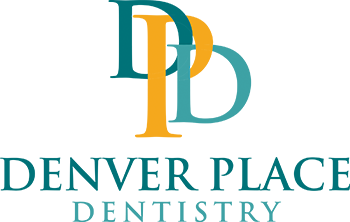Top Preventive Dentistry in Denver, Co
Preventive dentistry is the area of dentistry aimed to help people prevent oral disease and its further development. Preventive dentistry includes not just in-office dental care, but at-home treatments as well.
Some examples of at-home treatments include:
- Regular brushing– the American Dental Association (ADA) recommends brushing two times a day and directly after meals, when possible.
- Regular flossing– the ADA recommends flossing at least once a day.
- Rinsing with anti-bacterial mouth wash– recommended after each brushing
Proper brushing is essential in preventative dentistry. The proper way to brush your teeth is to use a soft nylon toothbrush with round-ended bristles. Next both the tooth surface and the gum line should be brushed by placing the brush at a 45-degree angle along the gum line and brushing gently in a rolling back-and-forth motion on the surface of the teeth. When brushing you should cover the inner surfaces of your teeth and then tilt the brush in order to brush the front teeth. The ideal brushing technique also involves the brushing of the tongue. Brushing should last until all teeth a gum lines have been thoroughly brushed.
Some examples of preventive dentistry you might receive in-office include:

We all hate to hear that our dentist has found new cavities since our last visit. Even worse, some cavities create pain that we can do little to alleviate. Cavities are areas of decay on teeth, and they can form on any surface of a tooth. To repair a cavity, the decay must be removed and replaced with a manmade substance. How can you deter decay to avoid negative reports from your dentist and nagging oral pain? First, you must understand what causes tooth decay.
The Cause
A healthy mouth contains natural, good bacteria that neutralize acids and help clean up food particles. These bacteria and your saliva also help strengthen areas of demineralization on teeth by restoring the minerals that protect teeth from decay.
Sometimes bad bacteria, plaque, can throw a healthy mouth’s homeostasis into chaos. Made from mucus, saliva, decaying food, and bad bacteria, plaque is a sticky substance that can build up on your teeth. Harmful bacteria in plaque emit an acid that eats away tooth enamel to create cavities. This acid can eat into the tooth, through the enamel, through the dentin, causing pain where nerves and blood vessels are vulnerable. Often, a cavity that grows to affect the dentin must undergo a root canal or extraction. In short, tooth decay can kill teeth.
The Cure
To prevent tooth decay, see your dentist twice each year for a thorough cleaning and oral exam. At home, you should brush your teeth with a soft toothbrush after each meal and floss daily. Mouthwash and fluoride rinses can help destroy harmful bacteria and re-mineralize teeth. Of course, staying away from foods high in sugars and starches will help since bad bacteria consider these two items a delicacy.
If you have small cavities, get them filled as soon as possible, before they grow and cause extensive damage. Professional fluoride treatments and dental sealants can also help deter tooth decay. Some patients have more problems with plaque than others. We’ll gladly help you understand the particularities of your mouth and recommend ways to prevent bacteria and tooth decay.
Although most people think they know the reasons for proper, daily tooth brushing, few people realize that clean teeth and healthy gums can protect against a variety of general, even life-threatening, oral health problems. When you don’t brush regularly, harmful bacteria multiply and plaque forms. Combined with sugar, saliva, mucus, and food debris, plaque creates a strong acid substance that eats away protective tooth enamel to cause tooth decay. A downhill slide can result.

Over time, the decay works its way below the enamel to infect tooth dentin, and this can cause pain and kill teeth. Meanwhile, plaque builds up on tooth surfaces irritates gums, causing them to pull away from the teeth and expose the sensitive tooth roots. Loose gums form pockets where bacteria gather, causing an infection. This can destroy the bone that holds teeth secure, resulting in tooth loosening or loss. Finally, chronic gum disease can break down the protective barrier between oral bacteria and your bloodstream. This allows bacteria to enter your bloodstream and increases the risk for a host of health problems like heart disease, stroke, respiratory illness, diabetes complications, and pregnancy complications.
Maintain good oral health by establishing a solid habit of brushing twice daily with a soft toothbrush, using the proper technique and quality fluoride toothpaste, and flossing carefully once a day. What’s the best brushing technique? That depends on your personal dentition, but general guidelines apply to all patients.
First, choose toothpaste with the ADA seal of approval. You should spend at least 3 to 4 minutes brushing with a small, soft, angled brush in little, circular motions across all tooth surfaces and the gum line. Cover two to three teeth at a time, applying gentle pressure. Harsh brushing can damage gums and cause painful sensitivity. After brushing your teeth, remember to brush or scrape your tongue to remove germs and bacteria that harm teeth and cause bad breath. Finally, rinse your entire mouth with water and spit out the debris. Brush twice daily or after meals, and floss between teeth once a day.
For more thorough brushing, consider purchasing an electric toothbrush. Some models feature an automatic cut off or warning light that kicks into action when you brush too harshly. Replace your toothbrush every three to four months so that the bristles remain effectively positioned and clean. For fresh breath and further prevention of bad bacteria, follow up with an over-the-counter mouthwash.
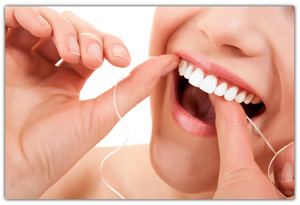
Bad Bacteria
You may not realize that even when your mouth is clean, bacteria lurk in the warm, damp cave, growing and eating incessantly. These naturally occurring microorganisms make a delicacy of even the most minute food particles, after which they deposit a sticky residue on the teeth called plaque. After you brush and floss, plaque accumulates throughout the day and night, especially in places where toothbrushes can’t reach.
Left to harden into tartar, plaque build-up irritates gums and can trigger inflammation and gum disease. Sound like a nasty situation? It doesn’t have to be. In fact, you can virtually eliminate plaque by carefully brushing and properly flossing every day.
It’s really that simple: your toothbrush cleans the tops and sides of your teeth, while the floss cleans between them. Flossing also polishes teeth and controls bad breath. An extra two or three minutes spent flossing each day can give you a huge advantage in the war against those bad bacteria. The American Dental Association (ADA) recommends brushing twice and flossing once daily.
Most US tap water contains fluoride today. However, most bottled water doesn’t. Many people have fluoride deficiency, which puts teeth at a greater risk for getting cavities. In some cases, parents think that they are protecting their babies by using bottled water to mix formula, but actually, tap water is better in this case. Many children pack bottled water in school lunches, and adults tend to toss a bottled water in the car instead of filling up a reusable water bottle with tap water.
Fluoride is an interesting mineral because it attracts other minerals and strengthens tooth enamel. At your dental checkup, we can determine whether your teeth would benefit from a fluoride supplement. If we find that your teeth could use a boost, we’ll recommend a simple solution.
Fluoride mouth rinse in many flavors is available at our Denver dental office. One quick rinse, and your teeth will have a better chance of staying healthy. We offer supplemental fluoride for patients of all ages. Oftentimes, our hygienist will recommend additional ways to keep your fluoride levels up between dental visits. These may include switching to tap water or using a fluoride-rich mouthwash at home.
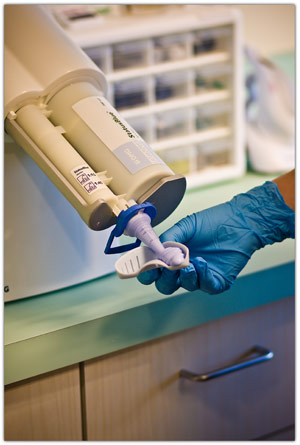
More than just a lifestyle problem!
More than 90 million people struggle with chronic bad breath. Typically, poor oral hygiene habits leave decaying food particles, other debris, and bacteria in the mouth. These conditions produce volatile sulfur compounds just like those found in rotten eggs, resulting in foul-smelling breath. Chewing gum, mints, and normal mouthwash won’t cure halitosis.

Bad breath is also one of the main symptoms of a serious underlying periodontal condition: gum disease. Many patients who come to us for help with halitosis don’t realize they actually have some form of gum disease. Although gum disease is terribly pervasive, it’s also preventable. When you visit our Denver dentist office because of halitosis, we will carefully check for the warning signs of gum disease: red, swollen, tender, or bleeding gums, gums pulling away from teeth, loose or separating teeth, pus between the gum and tooth, bite changes, and/or a change in the fit of partial dentures. If gum disease exists, treating it may also cure your halitosis.
Internal infections, diabetes, kidney failure, liver malfunction, and radiation treatment for cancer can contribute to halitosis. Lifestyle conditions such as stress, dieting, snoring, advancing age, and hormonal changes may also stimulate bad breath.
Hygiene, Rinses, & Relationships
Regardless of the cause, bad breath is treatable even if it is not associated with gum disease. First, institute effective oral hygiene: regular professional cleanings, brushing twice each day, daily flossing, and tongue cleaning. Effective tongue cleaning with a specially designed scraper will remove bacterial build-up 10 times more effectively than a toothbrush. If meticulous hygiene is insufficient for eliminating bad breath, invest in a professional breath kit such as the CloSYSII (available at www.rowpar.com), which includes a specially formulated toothpaste, a chlorine-stabilized rinse that destroys those odorous volatile sulfur compounds for up to 5 hours, and tongue scraper. Most people notice an immediate improvement. Better breath could also lead to better relationships!
Oral cancer kills more people nationwide than either cervical or skin (melanoma) cancer, and only half of patients diagnosed will survive more than five years. One American dies every hour from oral cancer. The most common risk factors are tobacco use, frequent high quantity alcohol consumption, constant sunlight exposure, habitual cheek or lip biting, or poorly fitting dentures.
Although 80 to 90 percent of oral cancers are found in people who use tobacco and/or drink alcohol excessively, 25 percent of oral cancers occur in people who have no risk factors at all.
Your dentist could very well be your number one soldier in the fight against oral cancer. Statistics show in about 10 percent of patients, dentists notice a problem area even before the patient notices. During a regular dental check up, your dentist will examine your entire mouth, searching for a flat, painless, white or red spot or small sore. Other signs of oral cancer can include:
- A sore that bleeds easily or does not heal.
- A color change of the oral tissues.
- A lump, thickening, rough spot, crust, or small, eroded area.
- Pain, tenderness, or numbness anywhere in the mouth or on the lips.

Two tests can determine if a trouble spot is cancerous. A brush biopsy is a painless test performed on areas that look harmless or do not have a clear cause. This test can detect potentially dangerous cells in the early stages of the disease. A scalpel biopsy, which requires local anesthesia, is usually performed on suspicious areas.
Remember to schedule regular check ups for everyone in your family. Two visits per year are recommended for general dental care. If you notice any unusual changes in your mouth in between visits, call your dentist immediately. Together you and your dentist can fight and win the battle against oral cancer.
For more information about oral cancer, support groups, or treatments, visit www.oralcancerfoundation.org.
How Your Oral Health Affects Your General Health
If you think about it, it makes perfect sense: poor oral health is linked to poor physical health. Your mouth is a key entryway into the rest of the body. If the mouth has a chronic infection or disease, then your entire body may be indirectly or directly exposed to those bacteria.
Research shows connections between periodontal disease and poor cardiovascular health, increased risk of stroke, diabetes, problem pregnancies, respiratory diseases, and osteoporosis in women. What’s more, some studies indicate that people who lose all of their natural teeth may have a much shorter life span.
If you want to increase your chances of living a happy, healthy life, treat your body with respect and put your money (and effort) where your mouth is. Try starting with the basics: learn the latest tips, techniques, and tools for top-notch oral hygiene. Then, branch out: incorporate a healthy diet, exercise, fresh air, and sufficient uninterrupted rest. Eliminate unhealthy habits, and remember, taking care of your teeth can benefit your whole body.
How we can help:
- Oral cancer screenings
- Regular check ups and professional cleanings
- Periodontal assessments for gum disease
- Snore guards for peaceful, rewarding sleep
- Restorative dentistry to eliminate bacteria and maintain tooth structure
- Sealants to deter tooth decay
- Fluoride supplements for healthier teeth
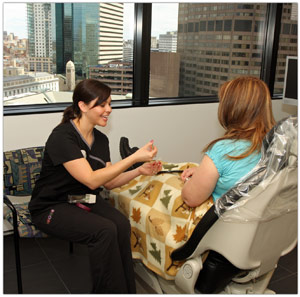
As our patients, your health and wellness are important to us. If you have questions about your oral health and its impact on your general health, please call our office, email us, or schedule a consultation today.
Healthy Hygiene, Healthy Heart
Believe it or not, how you take care of your teeth and gums affects not only your oral health, but it impacts your cardiovascular health, too. Although scientists are not certain of the precise relationship between the heart and oral hygiene, studies consistently demonstrate a link.
It’s possible that a mouth filled with bacteria and their toxins allows a continuous stream of poisons to enter the system. If the bacteria reach your arteries, they may cause the same kind of irritation they caused in your gums and mouth. Arterial wall irritations typically result in a buildup of protective plaque, which in turn can harden, thus blocking blood flow. Without sufficient blood flow, your heart can easily have a myocardial infarction, also known as a heart attack. Furthermore, loosened arterial plaque can travel through the bloodstream, reach your brain, and cause a stroke.
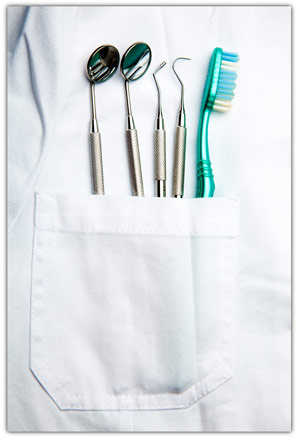
Prevention & Detection
One way we can fight this situation is to use a special bacterial neutralizing rinse immediately after dental procedures to reduce the possibility of bacteria entering your bloodstream. However, healthy mouth and gums are your best defense, so keep a regimen of daily brushing and flossing and regular dental visits twice a year. Remember, gum disease and oral cancer are silent but serious problems that may go unnoticed without professional exams.

Using visual and tactile exams, x-rays, and oral cancer screening, the overall health and presence of oral cancer can be revealed.
Gum care is an important factor in oral and overall health. Gum disease, also known as periodontal disease, hides in your mouth, destroying gum tissue and teeth, and it can lead to strokes, heart attacks, and pregnancy complications. Gum disease is the # 1 cause of tooth loss among American adults, with estimates reporting that up to 80 percent of the population unknowingly has gum disease in some form. Gum disease is caused by the bacteria in plaque, the sticky colorless film that constantly forms on your teeth. If not removed through daily brushing and flossing, plaque can build up and lead to the infection of your gums and teeth.
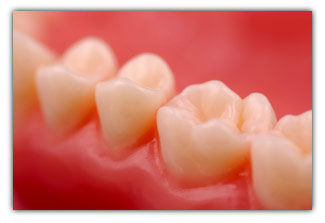
Seventy percent of adult tooth loss is attributed to gum disease. Recent research shows a link between patients who have gum disease and those who suffer from strokes, heart attacks, or complications with diabetes or pregnancy. Gum disease is silent in that early symptoms may be painless and mild, like swollen gums or bleeding while brushing. Regular dental checkups are vital because a professional can detect, treat, and reverse gum disease in early stages before major problems arise.
Treating Gum disease
Your stage of your gum disease will determine the level of treatment necessary. In order to decide the best options for your personal needs, Dr. Radz will first need to perform an extensive evaluation of your mouth, teeth and gums to develop a plan.
Common Gum Disease Treatments:
Non-Surgical Treatments: Dr. Radz believes that periodontal health should be achieved in the least invasive and most cost-effective manner possible. This is often accomplished by non-surgical treatments including scaling and root planing, a cleaning of the root surfaces to remove plaque and tartar from below the gumline and to smooth the tooth root to remove bacterial toxins. An adjunctive option to scaling and root planing may be provided in either pill form or applied directly to the infected area (gum pocket) in the form of antibiotic powder. In the event that non-surgical therapy does not achieve the desired results, surgery may be necessary to restore the gums that have been damaged by periodontal disease.
Advanced Periodontal Treatments: If Dr. Radz determines that the use of non-surgical treatments cannot repair your gums periodontal surgery may be recommended.
Maintaining Good Periodontal Health
Regular dental visits at least every six months allow us to keep a watchful eye on the health of your gums. You should also brush twice a day, floss once a day, and use good mouth rinses at home. We will recommend the products that will optimize your oral homecare, and we can also show you the best methods for brushing and flossing. If you have overcome periodontal disease, we will recommend frequent checkups to ensure your mouth stays healthy for a lifetime.

A mouth guard is a comfortable piece of athletic gear that fits over your teeth and can help protect your smile as well as your lips, tongue, face, and jaw. While preventative dentistry aims to help patients avoid dental disease, it also helps in the early detection and treatment of dental disease. By getting regular check-ups and screenings for oral disease you will increase your chances of catching something before it gets serious. The ADA recommends that patients seek dental care from a dental care professional at least twice a year. This is suggested so that the dentist may detect and hopefully prevent the signs of periodontal disease, dental decay, or any form of dental disease detected during a visit to the dentist’s office. For any further information please contact Cosmetic
Regular dental visits at least every six months allow us to keep a watchful eye on the health of your gums. You should also brush twice a day, floss once a day, and use good mouth rinses at home. We will recommend the products that will optimize your oral homecare, and we can also show you the best methods for brushing and flossing. If you have overcome periodontal disease, we will recommend frequent checkups to ensure your mouth stays healthy for a lifetime.
Getting the Bite on Mouthguards
Helmets, knee pads, shin guards…if you’re an avid athlete or the parent of one, you know the importance of proper protective gear. But did you know that up to 40 percent of all sports injuries involve the face? Protect your smile and mouth with a comfortable, custom-molded mouthguard to dramatically reduce the risk of sports-related oral injury.

Types of Mouthguards
Ready-Made Mouthguards
You may have seen ready-made mouthguards in a department or sporting goods store. These generic mouthguards are inexpensive and readily available. Unfortunately, because they are not custom-fitted, they may seem bulky and uncomfortable in your mouth. Ready-made mouthguards are secured by closed jaws which means, when an athlete wears a ready-made mouthguard, speaking and breathing may be difficult.
Mouth-Formed Mouthguards
If you’re looking for something that is more custom fit to your mouth, you might consider mouth-formed mouthguards. Acrylic, shell liner mouthguards provide a comfortable and secure fit over your natural teeth. Unfortunately, many users report that this mouthguard can have an unpleasant odor or taste. It can also harden over time and lose its flexibility. Another type of mouth-formed mouthguard, the thermoplastic style, can be customized by heating it in water, then biting it. It will take on the shape of your bite. While these maintain their flexibility, they can feel bulky.
Custom-Made Mouthguards
The best solution, custom-made mouthguards are comfortable, practical, and protective. A dentist or lab technician creates the custom-made mouthguard after taking impressions of your teeth.
Before you purchase any mouthguard, talk to your dentist. Special mouthguards or mouth protectors are recommended for patients with braces, removable bridges or dentures, a protruding jaw, or a cleft palate.
Mouthguard Care
Always wear your mouthguard during practice and games. Never chew on it because you may weaken the material and decrease its effectiveness. Holes, tears, and damage to the mouthguard may irritate your gums or soft tissue. If you notice damage, replace your mouthguard immediately.
Before and after each use, check your mouthguard for damage and rinse it with cold water or mouthwash. You should regularly clean your guard with a toothbrush and toothpaste or in a solution of soapy water. Be sure to rinse it well and store it in a firm, perforated container. Avoid placing it in direct sunlight high temperatures.
Most importantly, you should schedule regular dental check-ups, including one right before the playing season starts. When you see your dentist, bring your mouthguard and discuss any problems or concerns you may have.
ADA & ASD Advise
The American Dental Association and the Academy of Sports Dentistry recommend mouthguards for athletes who participate in:
| Acrobatics Bandi Baseball Basketball Bicycling Boxing Equestrian Events Field Events | Field Hockey Football Gymnastics Handball Ice Hockey Inline Skating Lacrosse Martial Arts | Racquetball Rugby Shot Put Skateboarding Skiing Skydiving Soccer Softball | Squash Surfing Volleyball Water Polo Weightlifting Wrestling |
It’s official. Women and men are not created dentally equal. Of course, good dental hygiene habits are equally important for all people, regardless of gender. However, growing evidence shows that women may be significantly more susceptible to serious health consequences from poor oral health. Even oral cancer, which used to affect men 6 times more than women now affects men only 2 times as often as women. In fact, in every season of a woman’s life, special precautions should be taken to preserve oral health.

Puberty and Oral Health
High hormone levels during puberty can result in sensitive gums. Irritation of the gums by plaque and food particles can cause redness and swelling. When this happens, periodontal therapy may help prevent damage to oral tissues. Brushing and flossing after meals will help reduce the cause of irritation. The sensitivity and resulting irritation will lessen as puberty progresses.
Menstruation and Oral Health
Monthly hormonal fluctuations and the resulting increased salivary proteins make women prone to bad breath just prior to their monthly cycles. To combat this, brush more diligently, floss more carefully, use a tongue scraper after each meal, and use a chlorine-stabilized alcohol-free mouth rinse every 5 hours.
Pregnancy and Oral Health
A mother’s dental health impacts not only her oral health but the health of her unborn child’s developing teeth as early as 6 weeks after conception. Increases in gingivitis, plaque, and non-cancerous pregnancy tumors of the mouth are a result of surging hormones. Good oral health is essential for women of child bearing age because periodontal disease can result in low-birth-weight-babies or pre-term births. The often painless, silent, and undetected disease affects 800,000 Americans annually, and an estimated 18 percent of low-weight births may be brought on by periodontal disease. Dentists encourage pregnant women to have a thorough cleaning during the first trimester and a short check up in each of the following trimesters.
Older Women and Oral Health
The presence of periodontal disease in women is closely linked to the incidence of osteoporosis, and vice versa. To make matters worse, after 35 years of age, periodontal disease in women is often a precursor to permanent tooth loss. In fact, studies show that half of post-menopausal women of eleven-plus years have lost at least one tooth. Why? Gum disease leads to gum detachment, which can lead to tooth loss; furthermore, tooth loss is linked to overall bone loss. Thus, in addition to vigilant home hygiene, older women should schedule regular dental and medical check ups.
How to Improve Women’s Oral Health
As a woman concerned with her health, how can you reduce the possibility of gingivitis, gum disease, and tooth loss? Regular check ups, daily brushing and flossing, and an extra dental visit whenever you notice a change in your teeth or gums can help. A healthy diet with plenty of vitamin C and B-12, calcium, and vitamin D for calcium absorption will maintain strong oral conditions. As with most diseases and medical conditions, the earlier a problem is detected, the better the chance for successful treatment and full recovery.
